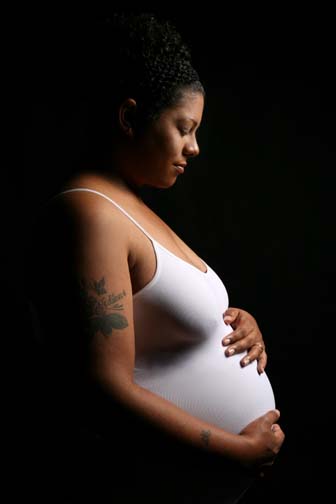For me, one of the most difficult things to accept in the weeks following Julian's death was my new identity as a mother of a dead child. I was now part of a minority group that I didn't wish to belong to. My body grieved Julian by continuing to lactate despite the fact that he was gone and by continuing to produce "nurturing" hormones that made me want him even more. I paced my apartment in my nightgown, not knowing what to do, because what I was supposed to be doing was caring for my precious little boy.
Instead, we spent the first few weeks without him planning what to do with his remains, going over autopsy reports, arguing with the insurance company, and putting his things away. In my head, I constantly chanted, "I want my baby, I want my baby." I relived my last days of pregnancy and our short time with Julian every night as I fell asleep, and cried every morning when I woke up and realized that it wasn't all just a horrible nightmare. His beautiful face is etched in my memory and I can never forget.
Because the majority of pregnancies result in healthy babies, most people are blissfully unaware of what can go wrong during pregnancy and childbirth, and are therefore ill-equipped to respond to miscarriage, unexpected fetal illness or demise, stillbirth, or infant death. Not knowing what to say to the bereaved can be a source of discomfort, but that discomfort pales in comparison to the distress felt by the parents of a dead child. Grieving parents need compassion, patience, and kindness, and should never be put in the position of having to manage others' discomfort.
Our culture tends to believe that modern medicine is a fix-all solution, yet there are unfortunately many circumstances that are out of our control, despite the most heroic of medical interventions. When we first found out that something was seriously wrong with our son Julian's heart, most of our friends and acquaintances tried to reassure us by reminding us about "medical miracles."
In Julian's case, we were told that heart transplant was his only chance for survival, but that even that would not provide a long-term solution (and that's assuming that a compatible donor heart were available). We were told that transplant was like exchanging one disease process for another, and that the 5 year survival rate was only 50%.
Complications of heart transplants in infants include mental retardation, growth retardation, speech and developmental delays, a lifetime of immunosuppressive drug treatments and doctor's visits, and at least one further heart transplant. Simply put, our chances for bringing home a healthy baby were slim at best. There was nothing anyone could say to change that fact, nor the fact that he died.
From research and experience (yes, I have actually heard these things!), I have come to learn that bereaved parents need compassion and acknowledgement of their child who died, without judgment. While no one can know the right thing to say, the best responses are those that are honest, such as "I don't know what to say, but I'm sorry," or "I feel guilty that I have a healthy baby" if that is how you feel.
It's always better to say what's on your mind than to avoid the person, leading to his or her further sense of social isolation. The following is a list of what NOT to say to someone who has lost a child. If you have lost a child yourself, please feel free to add to this list by contributing a comment.
1. Nothing. Some people choose to say nothing because they aren't sure what to say, they are uncomfortable with death and reminders of their own mortality, they don't want to lose control of their emotions, they don't want to upset a grieving parent, or in rare cases, because they are truly insensitive people (really!). In reality, most bereaved parents welcome any words or acts of kindness, love, and support, as long as they are sincere.
I certainly welcome the opportunity to talk about Julian, and appreciate when others are able to mention his name or ask questions about my labor/delivery, which was one of the proudest moments of my life. I did have a baby, after all. I am a mother, although my child is not with me, and like any mother, I am always thinking of him. There is no right thing to say (arguably, there are wrong things to say, which I will get to later), but to a parent who has lost a child, acknowledging their loss is to acknowledge that the child existed.

In our case, even the Federal government acknowledges that Julian was here! We wouldn't expect any less from our friends, family, or colleagues.
2. "You're young, you can have another baby." This comment, though meant to give the bereaved parent hope for the future, does not acknowledge the importance of the baby who died. It suggests that a future child will be a replacement for the baby who died, rather than a sibling. It also falsely assumes that having another baby will erase the pain of the devastating loss when, chances are, the bereaved parent will never be "over" the baby they lost.
3. "It was God's will," "Everything happens for a reason," "God had another plan," "It was meant to be," or similar sentiment. People will often say these things to a bereaved parent without really thinking about what they are saying. Often, well-meaning outsiders take tragedy and loss as an opportunity to share their faith or to come up with their own explanation for the loss according to their religion, assuming that the grieving parent will share their beliefs. Firstly, not everyone believes in God, and secondly, not all religious people believe in fate or rely upon blind faith.
Personally, I do not choose to believe in a God that plans disasters and tragedies. To some bereaved parents, saying "It was God's will" is like saying that God meant to kill their baby. This is certainly far from comforting. For a thoughtful, in-depth discussion of this issue, I recommend When Bad Things Happen to Good People by Rabbi Harold Kushner.
4. "I know exactly how you feel." Every loss is unique and important, but it's important to try not to compare your experience of the loss of, say, your dog, to the bereaved parents' loss of their baby. My first childhood dog, Tiki, died when I was away at college. I felt I had lost my best friend. I was incredibly sad and cried for weeks. However, the grief that I felt over my dog's death had a beginning and an end. I was incredibly depressed years later in graduate school when my grandmother died and had to request extensions on my coursework. The death of an elderly person, unlike that of a child, however, is expected, and therefore often easier to accept.
Research over the past several decades has consistently shown that the loss of an infant is one of the most stressful events an adult may experience, and that the intensity of the grief experienced by parents following such a devastating loss is significantly higher than that experienced following the loss of a spouse or parent. In addition to the loss of the baby, bereaved parents often feel that they have lost a part of themselves. The loss of a baby also represents a loss of hopes and dreams, a loss of parenthood, a loss of innocence, and to a certain extent, a loss of the joy of pregnancy due to the fear of another loss.
5. "Are you feeling better?" To the grieving parent, this question sounds more like, "Aren't you over that yet?" and implies that grief has a timeline and that you are becoming impatient with the amount of time it is taking for the bereaved parent to "get over" his or her child. Parents never "get over" their children; they work through their grief, but they will never forget the child they lost, who will always be a part of their family.
It may take a great deal longer than you may expect for a bereaved parent to truly feel happy again. Everyday joys are often experienced as bittersweet for a mother or father who wishes she or he could have shared those experiences with the child they lost. A better question to ask is, "How are you?" or "How are you feeling?" These questions are non-judgmental and demonstrate that you are not making assumptions about where you think the bereaved parent should be in his or her grief work.







